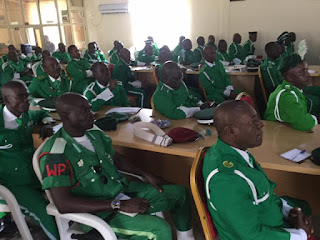THE ROLE OF OPPOSITION PARTIES IN A NATION
Every democracy, across the world, has a ruling political party. They also have political parties who presented canditates in the federal, state and/or local elections but failed. In the UK, the opposition party, forms a shadow cabinet, aimed at playing a positive role for the benefit of the United Kingdom.
Generally, the opposition has some significant roles to play but such roles must be played in such a manner, that the overall interests of the people, are well protected. Here are some:
1. Constructive criticism: Opposition parties can provide valuable feedback and suggestions to the ruling party on policies, legislation, or government actions. This constructive criticism can help the ruling party improve their decision-making process and avoid potential errors.
2. Bi-partisan collaboration: Opposition parties can work with the ruling party to find common ground and collaborate on specific issues or policies. By putting aside partisan differences, opposition parties can contribute to the development of well-rounded and inclusive policies that benefit the nation as a whole.
I witnessed this during the issue of BREXIT, when Labour and Conservative parties, collaborated to campaign against leaving the EU.
3. Holding the ruling party accountable:
Opposition parties play a vital role in ensuring transparency and accountability in governance. They can question the ruling party's actions, demand answers, and hold them accountable for their promises and commitments. This helps promote a healthy democratic system and prevents abuse of power.
4. Offering alternative solutions:
Opposition parties can provide alternative policy proposals or solutions to address societal issues. By presenting these alternatives, they can contribute to broadening the debate and encouraging the ruling party to consider different perspectives. This ultimately leads to more comprehensive and well-informed decision-making.
5. Engaging in constructive discussions:
Opposition parties can participate in parliamentary debates, committees, and other forums to voice their concerns, engage in meaningful discussions, and contribute their expertise. This open dialogue allows for a more inclusive and informed decision-making process.
6. Supporting positive initiatives:
Opposition parties can extend their support to the ruling party's positive initiatives or policies that align with their own principles and values. This signifies a willingness to prioritize the well-being of the nation over partisan interests, fostering a cooperative and inclusive political environment.
It is important to note that supporting the ruling party does not imply blind agreement or compromising on core principles. Opposition parties should continue to uphold their commitments to their voters and act in the best interest of the nation while providing constructive support to the ruling party when appropriate.
When an opposition party in a country becomes antagonistic, several consequences may arise:
1. Political polarisation: Antagonism from an opposition party can deepen political divisions and lead to increased polarization within the country. This can result in a more hostile and confrontational political climate, making it difficult to find common ground or achieve bipartisan cooperation.
2. Deterioration of public discourse: An antagonistic opposition party can contribute to a decline in respectful and constructive public discourse. Instead of engaging in thoughtful policy discussions, politicians may resort to personal attacks, smear campaigns, or spreading disinformation, which can erode the trust of the public and undermine the democratic process.
3. Gridlock in governance: Antagonism from an opposition party can obstruct the functioning of the government. If the opposition party obstructs or opposes virtually all policies or legislation proposed by the ruling party, it may lead to gridlock in governance, making it challenging to pass laws, implement policies, or address pressing issues effectively.
4. Stifling of alternative viewpoints:
If the opposition party becomes excessively antagonistic, it can discourage individuals with differing opinions from participating in the political process. This can lead to a lack of diverse perspectives and ideas, ultimately limiting innovation and the potential for well-rounded decision-making.
5. Weakening of checks and balances:
An antagonistic opposition party may try to undermine the authority or legitimacy of the ruling party, potentially weakening the checks and balances that are critical for a functioning democracy. This can erode the accountability of the ruling party and hinder the mechanisms that ensure a proper balance of power.
6. Potential social unrest:
When the opposition party becomes highly antagonistic, it may cause dissatisfaction and frustration among its supporters. This can lead to increased political demonstrations, protests, or even unrest if tensions escalate beyond peaceful means. The stability and social cohesion of the country may be compromised as a result.
It's important to note that in a healthy democracy, opposition parties play a crucial role in holding the ruling party accountable and providing alternative perspectives. However, when opposition parties become excessively antagonistic, these consequences might arise, potentially harming the democratic process and the overall well-being of the country.
This is exactly what we have in Nigeria. God save Nigeria.




Comments
Post a Comment